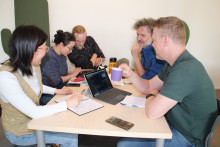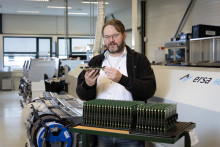Marcel Van Verk did a PhD in Leiden on defense mechanisms in plants. Meanwhile he mastered computer science as a hobbyist. “When the first DNA sequencing machine was brought to market, I realized I could use it to find pieces of relevant DNA that we could follow up in the lab,” says Van Verk, who started to integrate the use of data in his scientific work. The field of Bioinformatics hardly existed when Van Verk moved on into a postdoc position where he could devote half of his time on data and the other half in the lab. Later, data science and software development became the core of his scientific work at the Universities of Leiden and subsequently Utrecht. In 2017 he joined KeyGene as a team leader in the Crop Data Science department, which he currently heads as Vice President.
 Deep learning
Deep learning
KeyGene’s partners are plant breeders that aim to develop crops with a higher yield or improved resilience to diseases or drought. Data science is a great help because it can identify plant properties and relevant genes much faster than traditional breeding methods. “We develop complex computer models based on artificial intelligence and deep learning to facilitate the selection of plants for breeding,” says Van Verk. “To analyze several types of data, like gene sequences or gene expression datasets, but also photographs of plants. A good model will find properties that we can link to specific gene sequences and ideally reveal unexpected relations.”
Explainable AI
However, finding relevant information is only possible with the right kind of data. Van Verk: "AI models can take misleading shortcuts. Take training an AI to spot tomatoes in images by the red color. If a red truck appears often in the background, the AI might start associating trucks with tomatoes instead." Because artificial intelligence is essentially a ‘black box’, KeyGene’s Crop Data Science department also specializes in explainable AI, which aims to find out what happens inside a model. “Trying to find out how a model weighs its input information helps to understand the model, but can also lead to new insights on the data,” says Van Verk.
Collaboration
Such insights must always be verified in real plants in the laboratory, which happens in-house. Collaboration between different teams at KeyGene is essential and comes natural. The company also has strong bonds with both industry and academia, says Van Verk: “We operate right between the two, working on scientifically relevant topics that are directly applicable. This attracts new employees that are really motivated to do something useful for society in their work.”
Just the right size
As Vice President, Van Verk creates the preconditions for his staff to flourish, and also contributes to the strategy of KeyGene as a whole. He feels that with about 150 employees, the company is just the right size. “We have experts for every part of the research line, which gives us a lot of innovation power. Yet we are small enough for everyone to know each other,” says Van Verk, who especially likes the energy among KeyGene’s employee’s. “Every day we are working on groundbreaking innovations, and there is a strong feeling of doing that together,” he says. “Often we have a vision but we don’t yet know how we will reach our goal. Yet after a few years our ideas worked out and we all feel proud.”
4TU Career special



 Deep learning
Deep learning





